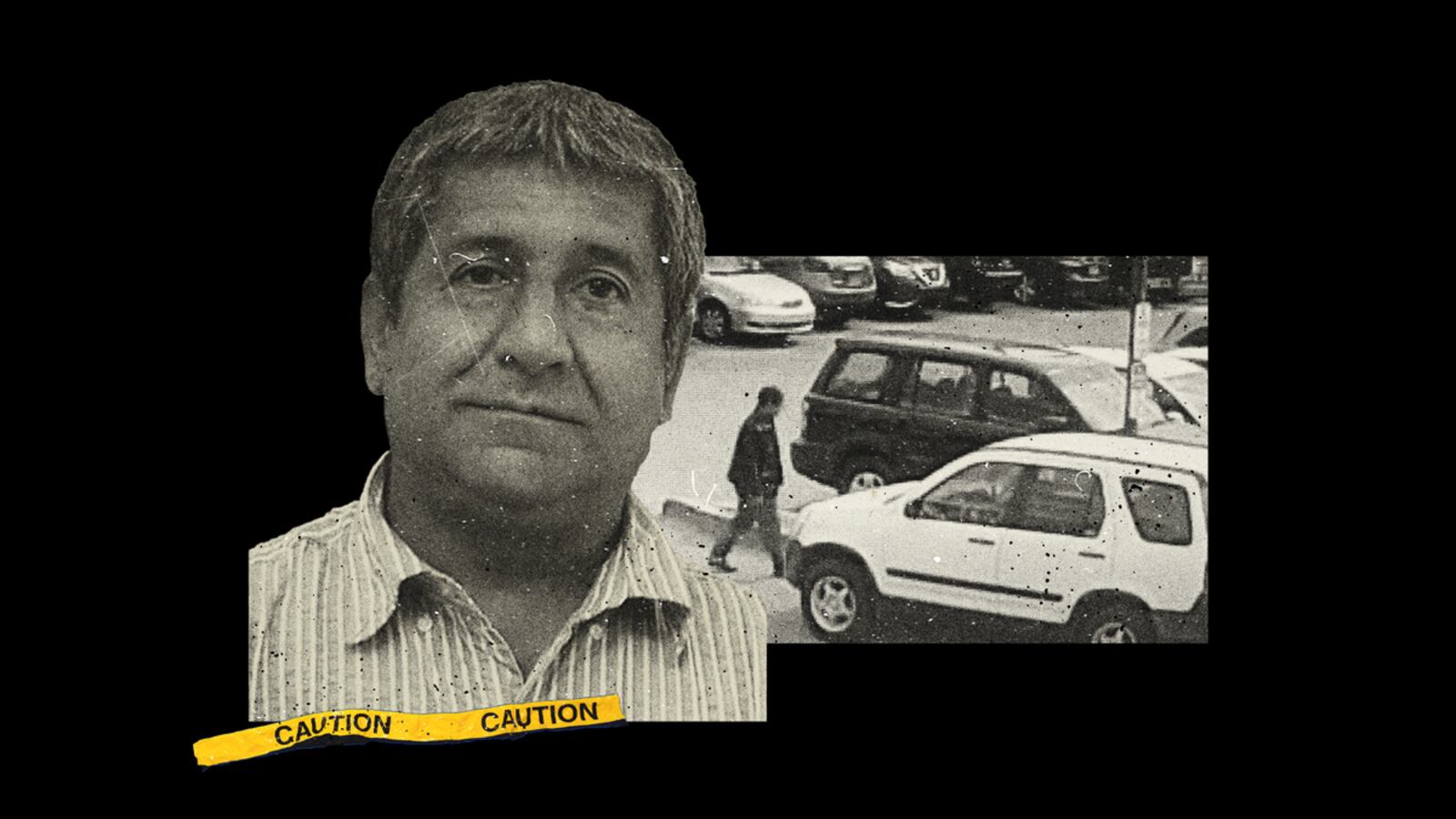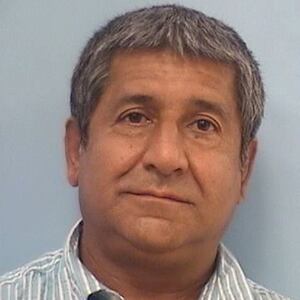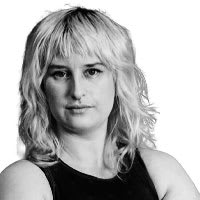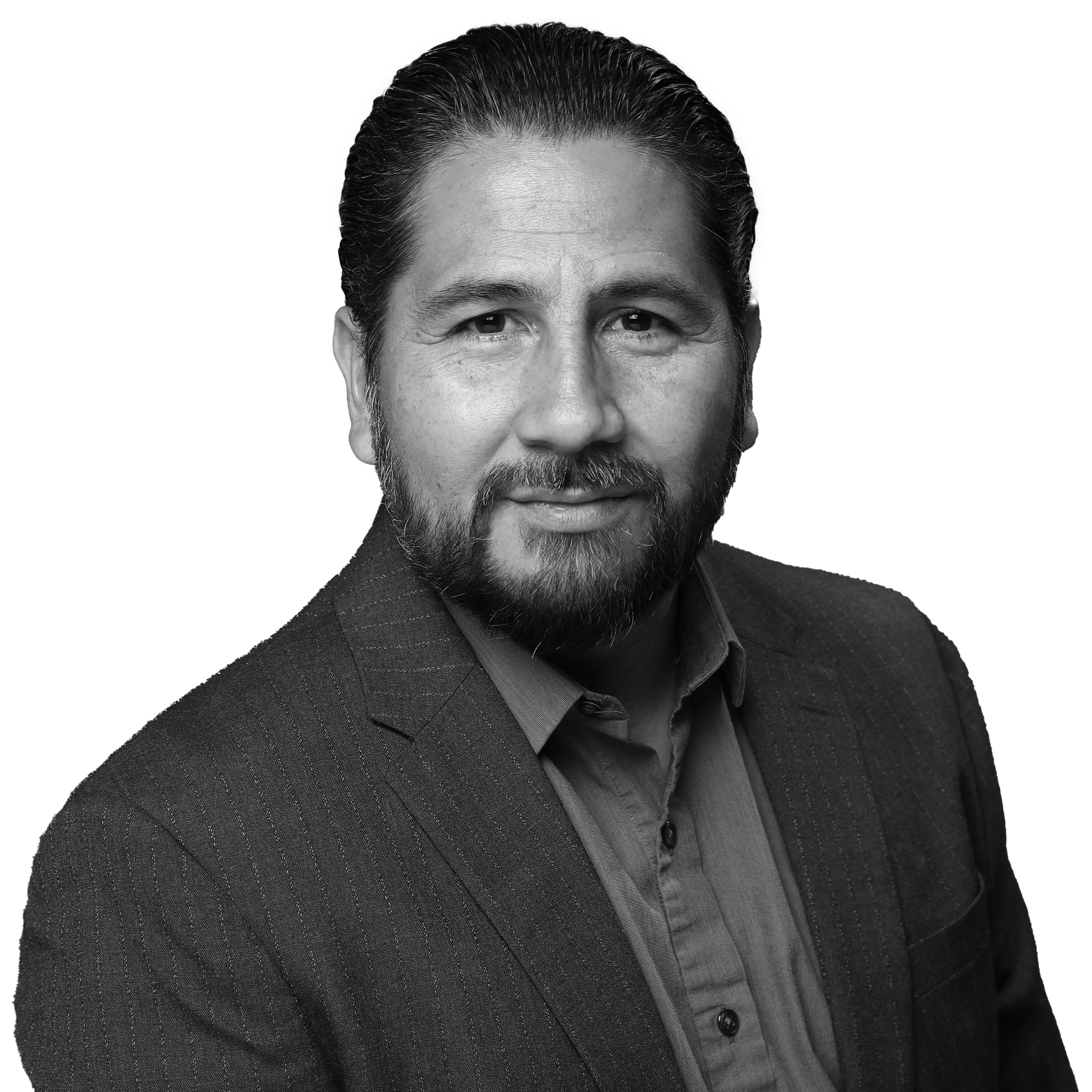As more details emerge about the criminal history of Muhammad Syed, 51, charged in the murders of two Muslim men in Albuquerque, and a prime suspect in the killing of two more, the family of one of the victims has blamed police for not intervening sooner.
Sharief Ahmadi Hadi, the brother of murder victim Mohammad “Zahir” Ahmadi, says that prime suspect Syed regularly harassed his family and slashed the tires of his wife’s car in the years before his brother’s murder. Hadi says he believes Syed targeted his family because they are Shiite Muslims.
Hadi’s brother, Muhammad Zahir Ahmadi, 62, was the first victim in a string of recent murders that have rocked the Muslim community of Albuquerque. Ahmadi was gunned down in the rear parking lot of the market he ran with his brother on Nov. 7, 2021. Syed has not been charged with his murder but police say he is their main suspect.
Hadi, who owns a Halal grocery store and cafe on San Mateo Boulevard in Albuquerque, told The Daily Beast he had been complaining to police for more than a year about Syed’s increasingly abusive behavior toward the Hadi family.
“I am tired of the police. I hate the police. Because the police, they didn’t do nothing—nothing! Look at everybody dying here. All these people murdered,” he said. Syed, he said, “would fight with me, he would fight with my brother.”
The Albuquerque Police Department told The Daily Beast it had not received any calls for service related to Syed from the store’s address.
Syed was, however, questioned and arrested multiple times by police for domestic violence and battery in the four years leading up to the murders of four Muslim men in Albuquerque, court and police records obtained by The Daily Beast show, but each time charges against him were dropped.
Hadi said the dispute between his brother and the Syed family may have started when Zahir refused to give Muhammad a refund for a bag of rice. “My brother rejected that,” Hadi said, adding that the relationship had deteriorated from there.
In February 2020, Syed approached the Hadi family’s empty car in the parking lot of the Islamic Center of New Mexico in southeast Albuquerque. Surveillance video captured by the center’s camera shows Syed walking up to a car and duck down out of sight. When he stands up he appears to be putting something into the pocket of his jacket. He then walks away calmly.
Hadi’s wife Nasima reported the tire-slashing to the Islamic Center and Syed was subsequently told to leave the center. He did not return for several months, according to reporting from the Albuquerque Journal.
A year and half later, on the evening of Nov. 21, 2021, Zahir was shot in the head as he sat in the back parking lot outside his store smoking a cigarette. The next morning, Hadi says he cleaned his brother’s blood off the asphalt.
Syed has now been charged with the murders of Aftab Hussein, 41, on July 26, and Muhammad Afzaal Hussain, 27, on Aug. 1. He is the “primary suspect” in the murders of Naeem Hussain, 25, who was killed on Aug. 5 after attending a funeral for two of the other victims, as well Ahmadi’s death, according to police. While three of the victims killed were Shiites, Muhammad Afzaal Hussain was a Sunni, the same as Syed, leaving many confused as to the true motives for the murders.
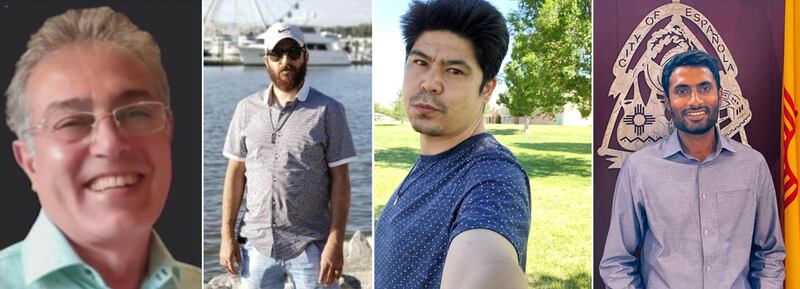
Mohammad Zahir Ahmadi, Naeem Hussain, Aftab Hussein and Muhammad Afzaal Hussain were all killed.
Photo Illustration by The Daily BeastHandout/City of AlbuquerqueHadi said his community has been on a knife edge as it searches for answers. He now carries a small Ruger pistol to defend himself.
“It’s always in my pocket,” he said, standing in his family grocery store. “If I see anybody come in and threaten me, I am going to shoot their face.”
Samia Assed, a longtime Muslim rights activist and community organizer in Albuquerque, says it’s wrong to understand the murders through the lens of Shiite-Sunni sectarianism.
“The true narrative is that we are a united front,” she said. “The majority of Shia in New Mexico actually do not want division with the Sunnis.”
Assed does not think Syed was motivated by rage over his daughter’s relationship with a Shiite man, as some reports have suggested. She said both Sunnis and Shiites in the community had attended Syed’s daughter’s wedding and “both families were happy.”
Instead, she suggested Syed might be unstable or traumatized.
“He has only been here five or six years, so he most likely witnessed atrocities in Afghanistan. All of that has an impact on his psyche,” she said, “It could be a control thing, packaged with patriarchy.” Hatred towards Shiites, she said, could just be a facet of larger mental illness.
“There is a lot we don’t know,” Assed said.
The Syed family first arrived in Albuquerque about six years ago, joining a small, tight-knit Afghan refugee community in New Mexico’s largest city. They settled in an apartment complex in the south-east of the city. It appears the family were native Pashto speakers, and part of Afghanistan’s Sunni Muslim majority.
In an interview with police after his arrest, Syed said he had served in the Special Forces in Afghanistan, and had fought against the Taliban. US Army Special Forces were among the first troops to land in the country in 2001, training and supplying Afghans and coordinating between the US and various groups on the ground. They were also among the last to leave, remaining on the ground even after conventional troops withdrew in 2015.
Syed told Muhammad Imtiaz Hussain, the older brother of 27-year-old victim Afzaal Hussain, in a conversation at the local mosque, that he had spent time in a refugee camp in Pakistan—a common journey for those fleeing Afghanistan.
Once settled in Albuquerque, Syed’s sons, Adil and Shaheen, started Facebook accounts that documented their early years there—sharing pictures of motorcycles and cars, and selfies taken in the wild New Mexican desert.
But inside the Syed house, trouble was brewing.
As early as 2017, police were regularly called to respond to reports of Syed’s alleged violence and coercive control over his wife and children. However, again and again, charges filed against him were dropped by his family members.
In July 2017, Syed’s daughter Lubna told police she had “ongoing verbal and physical disputes with her very conservative Muslim parents,” according to police records obtained by The Daily Beast. Police noted Lubna’s eye was swollen, but she told police she didn’t want to press charges against her father as “it would only make their family dynamic worse.” The cops left without making an arrest, instead warning Syed “he cannot physically abuse Lubna or anyone else in the household.”
Many of the police reports center around Lubna, who battled with her parents for independence. Of particular concern to Syed was her relationship with Iftikhar Amir, who is a Shiite Muslim, and who later became Lubna’s husband.
In December 2017, Syed reported that he had been stabbed following a physical altercation with Amir where Lubna’s parents confronted him on the street and Syed told police his daughter’s boyfriend stabbed him with a large knife. Amir was never charged.
This was the start of a series of allegations of assault, battery and harassment between Syed and Amir.
Records show Syed was issued a summons for battery after Amir told authorities that Syed and his wife and son allegedly pulled Amir out of Lubna’s car, punching and kicking him. Amir told police that Lubna’s family attacked him because they “did not want her having a relationship with [him].” It doesn’t appear Syed, however, was ever prosecuted.
In early 2018, Amir told police Syed had threatened to kill him, according to police reports. Syed responded by alleging Amir was harassing him with threatening phone calls. The police ordered the two men to stay away from each other, but once again no charges were filed.
Syed’s alleged violence was beginning to spill out of his home, becoming increasingly public.
In 2018, he was arrested for beating his wife in the lobby of the New Mexico Department of Human Services, where the couple had an appointment. His wife was found by employees on the floor of the building’s lobby, yelling “My husband! My husband!” with a large chunk of hair missing from her scalp. Again, the battery charges against Syed were dropped. Court records show prosecutors declined to prosecute the case.
Police were again called to the Syed house in December 2018, where Shaheen (who was then going by the name “Maiwand”) told police his father had attacked him and his mother with a large metal spoon, causing a bleeding laceration on Shaheen’s head. He said that his father regularly beat him and his mother but once again the family appears to have closed ranks to protect Syed. He was arrested and had the case dismissed by taking part in a court-ordered diversionary program.
In 2020, Syed was involved in an incident of alleged violence against someone outside his immediate family. In January, police were called after Syed allegedly kicked and threw an object at a Walmart employee apparently without provocation. Then in February that year, Syed got into a shouting match with a police officer who stopped him for running a red light. He refused to comply with the officer and was taken to jail. That same month, Syed was caught on camera allegedly slashing the tires of the Hadi family’s car.
It was after this escalating behavior, at the start of 2021, that Syed and his sons began purchasing firearms. In January 2021, Syed bought a 9mm pistol at an Albuquerque gun store, according to a police arrest document.
Five months later, Syed’s son Shaheen purchased two rifles and allegedly falsely stated on the paperwork that he lived at an address in Florida.
On Nov. 21, 2021, the first victim in the spate of killings, Hadi’s brother Zahir, was shot behind the family’s grocery store. No one was immediately arrested.
On May 28, Syed purchased a new hammer and scope for his AK-47 from a local gun store. In a police interview prior to his arrest, Syed said he liked the AK-47 platform because “he had one in Afghanistan,” and added that he kept the gun in “a cardboard box, under his bed, in his bedroom.”
On July 15, Syed and his son, Shaheen went to BMC Tactical, a local gun store, where Syed purchased an AK-47-style rifle and Shaheen purchased an AK-47-style pistol.
Eleven days later, a second Muslim man was killed. Aftab Hussein was found by police on Rhode Island Street having sustained multiple gunshot wounds. Police believe Syed was allegedly hiding behind a bush where Hussein usually parked his car, and shot him multiple times.
Andrew Skinner, Hussein’s manager at the Flying Star Cafe, said Aftab was “one of the hardest working people I knew” and engaged to be married in the next year. He was shocked that his coworker and friend was fatally ambushed. “I had never heard him mention a thing about feeling threatened or that he was in danger of any kind,” Skinner said.
On Aug. 1, Syed bought a new scope for his AK-47, according to his arrest warrant.
That same day, Muhammad Afzaal Hussain, 27, was killed in a drive-by shooting near the intersection of Cornell Drive and Garfield Avenue. He was pronounced dead at the scene, according to police documents. Casings found at the scene matched casings collected at Aftab Hussein’s killing, according to the arrest warrant for Syed.
Muhammad Imtiaz Hussain, Afzaal’s older brother, says the medical examiner informed him two different weapons were used when his brother was ambushed.
The Albuquerque Police said they were still waiting for the final ballistics report to come back and could not comment on how many weapons were used.
Imtiaz, 41, told The Daily Beast that Afzaal was like a son to him. He recalls helping to raise him in Pakistan, where they lived in a one-room house with four other siblings. Afzaal came to America in 2017 to attend graduate school at the University of New Mexico, living in an apartment just blocks from campus with Imtiaz and his children.
The murder “seemed like it was very planned,” Imtiaz said. “The way he was butchered. He was ambushed.” Imtiaz said that the killer’s bullets removed half of his brother’s head. “Who are the people who wanted to take such a beautiful man from us?”
At the time of Afzaal’s death, he was working for the city of Española, where officials appreciated him so much they helped him secure a place to live: a ranch house on 100 acres. According to Imtiaz, his American Dream was fulfilled. He wanted to help people in poverty in Pakistan. He also wanted to run for political office after getting his green card and meet his future wife and raise his kids in New Mexico.
Imtiaz told his father in Pakistan that he will work hard to make sure Afzaal’s killer is brought to justice. He said his dad responded, “Whatever you do, our loss will not be compensated.”
Four days after Afzaal was killed, Naeem Hussain was found shot by police officers in the area of Truman Street and Grand Avenue. It was a little before midnight last Friday. The 25-year-old had recently attended a funeral for two of the other shooting victims.
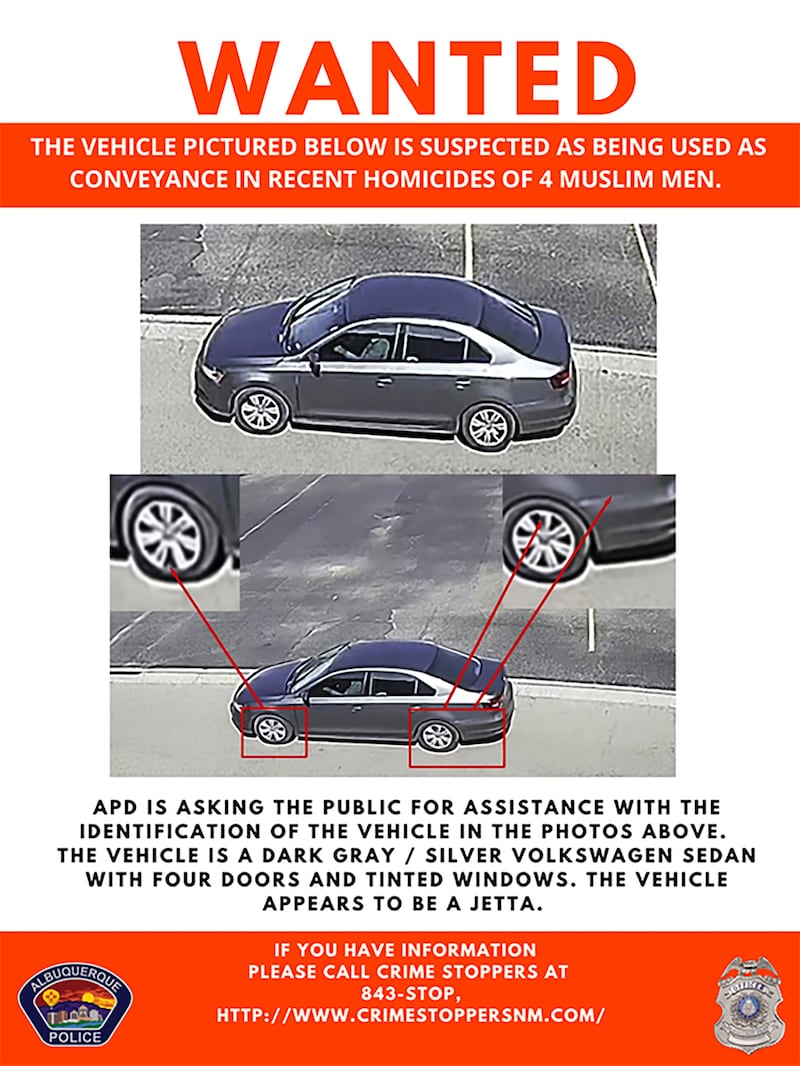
The handout image looking for the suspect’s car.
Handout/City of AlbuquerqueEarly Tuesday morning, police arrested Syed in Santa Rosa, New Mexico, as he was driving east on Interstate 40. He told police he was going to Houston, Texas, to find a new place for his family to live “because the situation in Albuquerque was bad,” referencing “the shooting of Muslims on the news.”
The following day, Syed’s son Shaheen was arrested and held on federal charges for giving the false Florida address when he purchased two rifles in June, 2021.
In a police interview prior to his arrest, Shaheen denied taking part in the shootings of the four victims and said he was not allowed to touch his father’s guns, according to police documents.
He told investigators his father, Syed, would sometimes take him on “hunting” trips to the desert, where they would shoot an AK-47.
Syed was charged with the murders of Aftab Hussein and Muhammad Afzaal Hussain, while charges have not yet been bought for the murders of Naeem Hussain and Mohammad “Zahir” Ahmadi.
Syed’s son-in-law, Iftikhar Amir, declined to comment when approached by The Daily Beast at his home this week on the possible involvement of his father-in-law in the violent crimes. His wife, Lubna, told KRQE she believes her father is innocent: “He didn’t do anything”.
“My father is not a person who can kill somebody. My father has always talked about peace. That’s why we are here in the United States,” she told CNN. “We came from Afghanistan, from fighting, from shooting.”
But the community, and particularly the families of the victims have felt anything but peace.
“If you want to know how much we have lost, I have no words,” Imtiaz, the brother of murder victim Afzaal Hussein, told The Daily Beast. “Just everything.”
